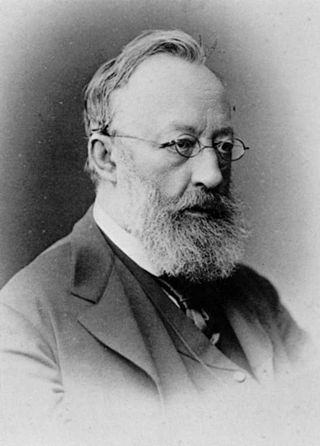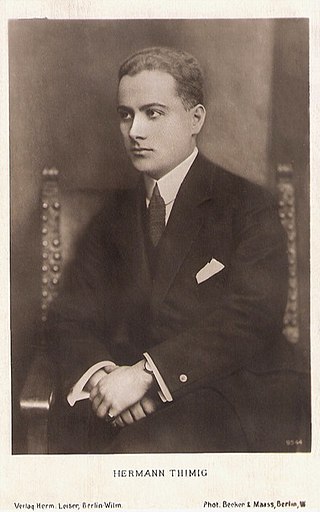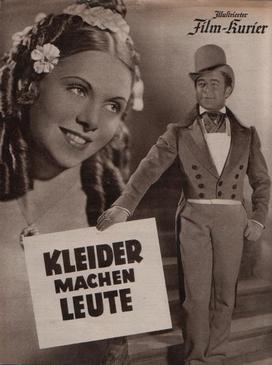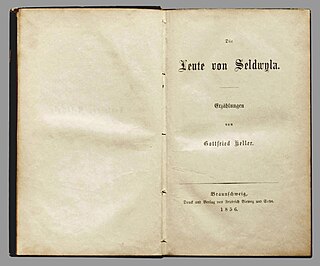Related Research Articles

Gottfried Keller was a Swiss poet and writer of German literature. Best known for his novel Green Henry and his cycle of novellas called Seldwyla Folks, he became one of the most popular narrators of literary realism in the late 19th century.
This article contains information about the literary events and publications of 1856.

The Chocolate Soldier is an operetta composed in 1908 by Oscar Straus based on George Bernard Shaw's 1894 play, Arms and the Man. The German language libretto is by Rudolf Bernauer and Leopold Jacobson. It premiered on 14 November 1908 at the Theater an der Wien.

Cycle of the Werewolf is a horror novella by American writer Stephen King, featuring illustrations by comic-book artist Bernie Wrightson. Each chapter is a short story unto itself. It tells the story of a werewolf haunting a small town as the moon turns full once every month. It was published as a limited-edition hardcover in 1983 by Land of Enchantment, and in 1985 as a mass-market trade paperback by Signet. King also wrote the screenplay for its film adaptation, Silver Bullet (1985). It is King's shortest novel to date at 127 pages, which makes it technically a novella.

Lawrence Block is an American crime writer best known for two long-running New York-set series about the recovering alcoholic P.I. Matthew Scudder and the gentleman burglar Bernie Rhodenbarr. Block was named a Grand Master by the Mystery Writers of America in 1994. Block has written in the genres of crime, mystery, and suspense fiction for more than half a century, releasing over 100 books.
Ethan Mordden is an American author and musical theater researcher.

The Story of Esther Costello is a 1957 British drama film directed by David Miller and starring Joan Crawford, Rossano Brazzi and Heather Sears. It was produced by Miller and Jack Clayton. The screenplay by Charles Kaufman was based on the 1952 novel by Nicholas Monsarrat. It was distributed by Columbia Pictures. The film is a story of large-scale fundraising.
The Captain of Köpenick is a satirical play by the German dramatist Carl Zuckmayer. First produced in 1931, the play tells the story, based on a true event that happened in 1906, of a down-on-his-luck ex-convict shoemaker who impersonates a Prussian Guards officer, holds the mayor of a small town to ransom, and successfully "confiscates" the town's treasury, claiming to be acting in the name of the Kaiser. The Prussian cult of the uniform ensures that the townspeople are all-too willing to obey his orders, in stark contrast to the treatment the protagonist was given before he donned the uniform. Zuckmayer described the story as a "German fairy tale".
Hans Emil Thimig, pseudonym: Hans Werner was an Austrian actor, film director, and stage director.

The Alchemaster's Apprentice is a fantasy novel by Walter Moers, first published in August 2007. It is the fifth of his novels set on the continent of Zamonia, and as in the earlier Ensel and Krete and The City of Dreaming Books, Moers purports to be acting merely as the translator of a work by the Zamonian writer Optimus Yarnspinner. An English translation by John Brownjohn was published in 2010.

Hermann Thimig was an Austrian stage and film actor. He appeared in 102 films between 1916 and 1967.

Kleider machen Leute is a comic opera in a prologue and two acts by Austrian composer Alexander Zemlinsky. The libretto was written by Leo Feld, based on the 1874 novella of the same name by Gottfried Keller.
Kleider machen Leute may refer to:

Clothes Make the Man is a 1940 German historical comedy film directed by Helmut Käutner and starring Heinz Rühmann, Hertha Feiler and Hilde Sessak. The film is based on the Novella Kleider machen Leute, published by realist author Gottfried Keller in 1874. It was shot at the Barrandov Studios in German-occupied Prague as well as at the Babelsberg and Tempelhof Studios in Berlin.
Clothes Make the Man is a 1921 Austrian-German silent film based on the 1874 novella by Gottfried Keller, directed by Hans Steinhoff and starring Hermann Thimig, Dora Kaiser and Hugo Thimig.

The Affair at the Semiramis Hotel is a 1917 detective novella by the British writer A. E. W. Mason featuring his character Inspector Hanaud. Mason had originally written many of the plot elements for an abortive silent film, to be called The Carnival Ball. The novella appeared between Mason's first full-length Hanaud novel, At the Villa Rose (1910), and his second, The House of the Arrow (1934).

The Stauffacherin is a Swiss legendary figure. According to Swiss folklore, she was the wife of Werner Stauffacher, the Landammann of the Canton of Schwyz and a founding father of the Old Swiss Confederacy. She was depicted in Friedrich Schiller's 1804 play William Tell as an advisor to her husband, advocating for Swiss independence from Habsburg rule. The image of the Stauffacherin, often viewed as the feminine counterpart to Wilhelm Tell, has become a symbol for Swiss national pride, spiritual national defence, democracy, and women's suffrage.
Kleider machen Leute is a 5-act German opera by Joseph Suder based on Gottfried Keller's 1874 novella of the same name set in Goldach, Switzerland. The opera was composed 1934 but not performed until June 10, 1964, at the Landestheater in Coburg. Suder had already started work on the opera when he discovered that Alexander Zemlinsky had already composed an opera on the same subject premiered in 1910.
Clothes Make the Man is a 1915 American film featuring Oliver Hardy.

Seldwyla Folks, also published as The People of Seldwyla, is a sequence of novellas by the Swiss writer Gottfried Keller. The ten stories are set around the fictional small town of Seldwyla in Switzerland. Each story is about an obsession or fixation that leads to excess, bigotry or self-indulgence.
References
- ↑ Studies in short fiction 1985 - Volumes 1-20; Volume 22 - Page 465 "In fact it is because Fortune rather than Fate drives the plot of Clothes Make the Man that the tenor of Keller's Novelle is so ... of evoking a sense of wonder in the townspeople of Goldach , where he moves to from his home town of Seldwyla ."